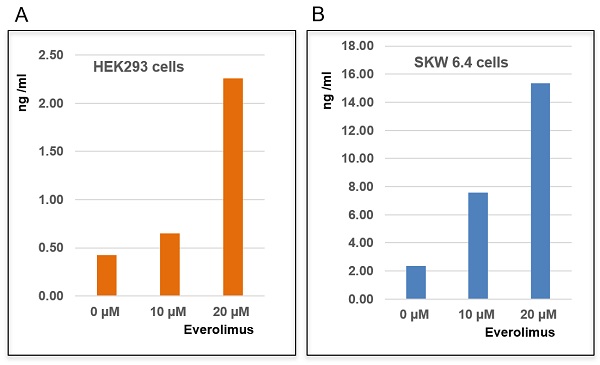Acyl-CoA-binding Protein (human) ELISA Kit
| Code | Size | Price |
|---|
| AG-45B-0019-KI01 | 96 wells | £540.00 |
Quantity:
Prices exclude any Taxes / VAT
Overview
Regulatory Status: RUO
Target Species: Human
Shipping:
BLUE ICE
Storage:
+4°C
Images
Further Information
Alternate Names/Synonyms:
ACBP; Diazepam-binding Inhibitor; DBI; Endozepine; EP
Assay Type:
Sandwich
Detection Type:
Colorimetric
EClass:
32160000
Handling Advice:
After standard reconstitution, prepare aliquots and store at -20°C.Avoid freeze/thaw cycles.Plate and reagents should reach room temperature before use.
Long Description:
Colorimetric Sandwich ELISA Assay. Detects human ACBP in serum, plasma and cell culture supernatant. Range: 0.03125 to 2ng/ml. Sensitivity: 26pg/ml. Acyl-coenzyme A (CoA)-binding protein (ACBP) is an ubiquitously expressed 86 aa polypeptide that binds medium- and long-chain acyl-CoA esters with very high affinity. It plays a role as an intracellular carrier of acyl-CoA esters and regulates lipid metabolism in the cytoplasm of most cell types. In addition to its function within the cells as acyl-coenzyme A (CoA)-binding protein, ACBP also functions as secreted protein called Diazepam-Binding Inhibitor (DBI) that can interact with the benzodiazepine-binding site of the gamma-aminobutyric acid (GABA) type A receptor, GABAAR, and modulate its activity. ACBP is secreted upon induction of autophagy (energy deficiency) in different organisms including mouse and human. ACBP levels correlate with human body mass index (BMI). Increasing ACBP levels in mice triggers lipogenesis, food intake and weight gain and neutralization of ACBP increases lipolysis, reduces food intake post-starvation and causes weight loss in mice. Obese patients exhibit elevated plasma levels of ACBP, while a reduction in the ACBP mRNA and ACBP plasma protein levels is observed in these patients after an important weight loss. ACBP might be useful for the prevention or treatment of obesity and metabolic syndrome diseases.
NCBI, Uniprot Number:
Q9BYF1
Package Type:
Box
Product Description:
Acyl-coenzyme A (CoA)-binding protein (ACBP) is an ubiquitously expressed 86 aa polypeptide that binds medium- and long-chain acyl-CoA esters with very high affinity. It plays a role as an intracellular carrier of acyl-CoA esters and regulates lipid metabolism in the cytoplasm of most cell types. In addition to its function within the cells as acyl-coenzyme A (CoA)-binding protein, ACBP also functions as secreted protein called Diazepam-Binding Inhibitor (DBI) that can interact with the benzodiazepine-binding site of the gamma-aminobutyric acid (GABA) type A receptor, GABAAR, and modulate its activity. ACBP is secreted upon induction of autophagy (energy deficiency) in different organisms including mouse and human. ACBP levels correlate with human body mass index (BMI). Increasing ACBP levels in mice triggers lipogenesis, food intake and weight gain and neutralization of ACBP increases lipolysis, reduces food intake post-starvation and causes weight loss in mice. Obese patients exhibit elevated plasma levels of ACBP, while a reduction in the ACBP mRNA and ACBP plasma protein levels is observed in these patients after an important weight loss. ACBP might be useful for the prevention or treatment of obesity and metabolic syndrome diseases.
Range:
0.03125 to 2ng/ml
Sample Type:
Cell Culture Supernatant, Plasma, Serum
Sensitivity:
30pg/ml
Specificity:
Detects human ACBP in serum, plasma and cell culture supernatant. It does not detect mouse ACBP.
Transportation:
Non-hazardous
UNSPSC Category:
ELISA Kits
UNSPSC Number:
41116126
Use & Stability:
12 months after the day of manufacturing. See expiry date on ELISA Kit box.



